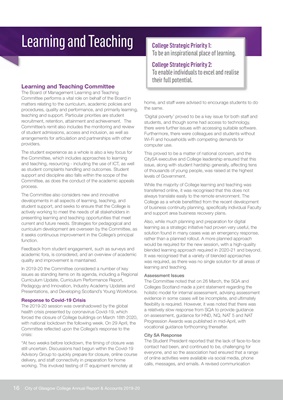
16 City of Glasgow College Annual Report & Accounts 2019-20
Learning and Teaching
Learning and Teaching Committee
The Board of Management Learning and Teaching
Committee performs a vital role on behalf of the Board in
matters relating to the curriculum, academic policies and
procedures, quality and performance, and primarily learning,
teaching and support. Particular priorities are student
recruitment, retention, attainment and achievement. The
Committee's remit also includes the monitoring and review
of student admissions, access and inclusion, as well as
arrangements for articulation and partnerships with other
providers.
The student experience as a whole is also a key focus for
the Committee, which includes approaches to learning
and teaching, resourcing - including the use of ICT, as well
as student complaints handling and outcomes. Student
support and discipline also falls within the scope of the
Committee, as does the conduct of the academic appeals
process.
The Committee also considers new and innovative
developments in all aspects of learning, teaching, and
student support, and seeks to ensure that the College is
actively working to meet the needs of all stakeholders in
presenting learning and teaching opportunities that meet
current and future needs. Strategies for pedagogical and
curriculum development are overseen by the Committee, as
it seeks continuous improvement in the College's principal
function.
Feedback from student engagement, such as surveys and
academic fora, is considered, and an overview of academic
quality and improvement is maintained.
In 2019-20 the Committee considered a number of key
issues as standing items on its agenda, including a Regional
Curriculum Update, Curriculum Performance Report,
Pedagogy and Innovation, Industry Academy Updates and
Presentations, and Developing Scotland's Young Workforce.
Response to Covid-19 Crisis
The 2019-20 session was overshadowed by the global
health crisis presented by coronavirus Covid-19, which
forced the closure of College buildings on March 18th 2020,
with national lockdown the following week. On 29 April, the
Committee reflected upon the College's response to the
crisis:
"At two weeks before lockdown, the timing of closure was
still uncertain. Discussions had begun within the Covid-19
Advisory Group to quickly prepare for closure, online course
delivery, and staff connectivity in preparation for home
working. This involved testing of IT equipment remotely at
home, and staff were advised to encourage students to do
the same.
'Digital poverty' proved to be a key issue for both staff and
students, and though some had access to technology,
there were further issues with accessing suitable software.
Furthermore, there were colleagues and students without
Wi-Fi and households with competing demands for
computer use.
This proved to be a matter of national concern, and the
CitySA executive and College leadership ensured that this
issue, along with student hardship generally, affecting tens
of thousands of young people, was raised at the highest
levels of Government.
While the majority of College learning and teaching was
transferred online, it was recognised that this does not
always translate easily to the remote environment. The
College as a whole benefitted from the recent development
of business continuity planning, specifically individual Faculty
and support area business recovery plans.
Also, while much planning and preparation for digital
learning as a strategic initiative had proven very useful, the
solution found in many cases was an emergency response,
rather than a planned rollout. A more planned approach
would be required for the new session, with a high-quality
blended learning approach required in 2020-21 and beyond.
It was recognised that a variety of blended approaches
was required, as there was no single solution for all areas of
learning and teaching.
Assessment Issues
The Committee noted that on 26 March, the SQA and
Colleges Scotland made a joint statement regarding the
holistic model for internal assessment, advising assessment
evidence in some cases will be incomplete, and ultimately
flexibility is required. However, it was noted that there was
a relatively slow response from SQA to provide guidance
on assessment, guidance for HND, NQ, NAT 5 and NAT
Progression Awards was published in mid-April, with
vocational guidance forthcoming thereafter.
City SA Response
The Student President reported that the lack of face-to-face
contact had been, and continued to be, challenging for
everyone, and so the association had ensured that a range
of online activities were available via social media, phone
calls, messages, and emails. A revised communication
College Strategic Priority 1:
To be an inspirational place of learning.
College Strategic Priority 2:
To enable individuals to excel and realise
their full potential.